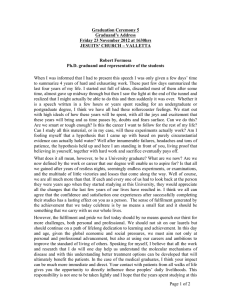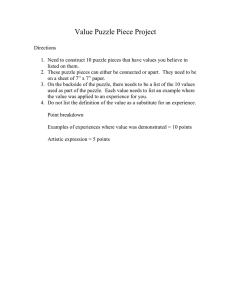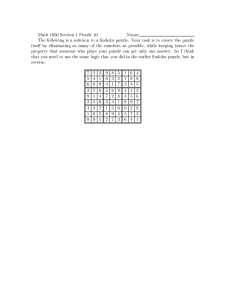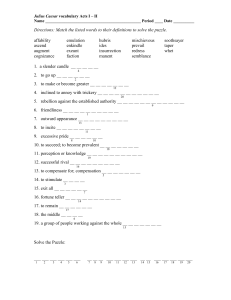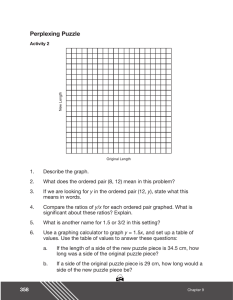Graduation Ceremony 3 Wednesday 19th November 2014 at 4.30 p.m.
advertisement
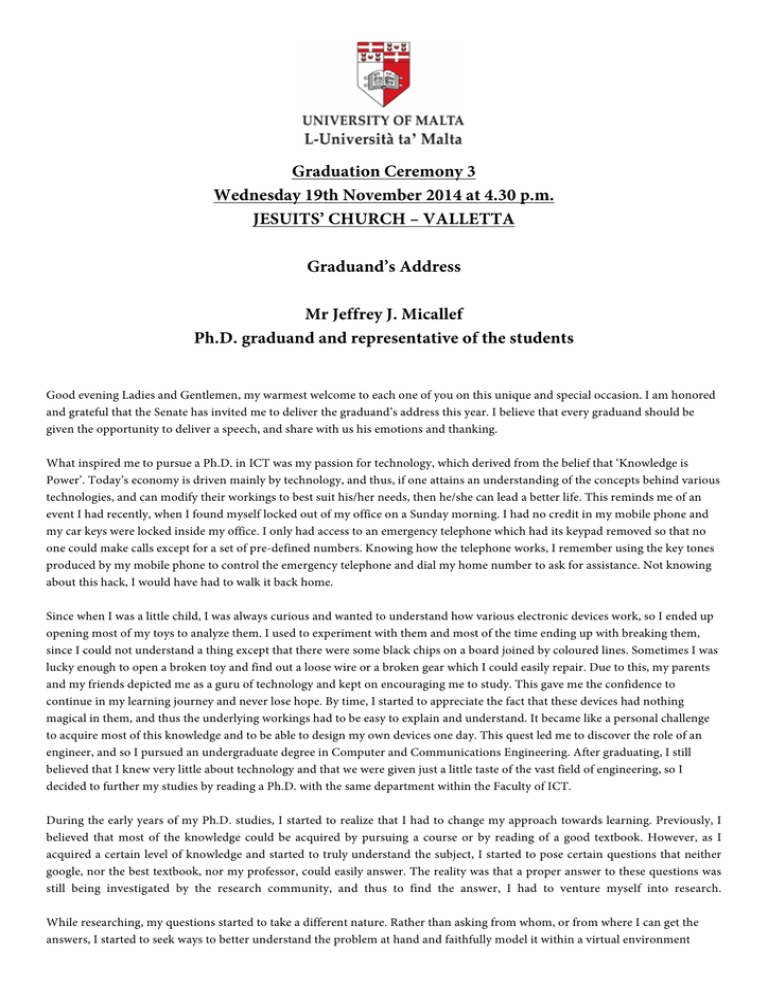
Graduation Ceremony 3 Wednesday 19th November 2014 at 4.30 p.m. JESUITS’ CHURCH – VALLETTA Graduand’s Address Mr Jeffrey J. Micallef Ph.D. graduand and representative of the students Good evening Ladies and Gentlemen, my warmest welcome to each one of you on this unique and special occasion. I am honored and grateful that the Senate has invited me to deliver the graduand’s address this year. I believe that every graduand should be given the opportunity to deliver a speech, and share with us his emotions and thanking. What inspired me to pursue a Ph.D. in ICT was my passion for technology, which derived from the belief that ‘Knowledge is Power’. Today’s economy is driven mainly by technology, and thus, if one attains an understanding of the concepts behind various technologies, and can modify their workings to best suit his/her needs, then he/she can lead a better life. This reminds me of an event I had recently, when I found myself locked out of my office on a Sunday morning. I had no credit in my mobile phone and my car keys were locked inside my office. I only had access to an emergency telephone which had its keypad removed so that no one could make calls except for a set of pre-defined numbers. Knowing how the telephone works, I remember using the key tones produced by my mobile phone to control the emergency telephone and dial my home number to ask for assistance. Not knowing about this hack, I would have had to walk it back home. Since when I was a little child, I was always curious and wanted to understand how various electronic devices work, so I ended up opening most of my toys to analyze them. I used to experiment with them and most of the time ending up with breaking them, since I could not understand a thing except that there were some black chips on a board joined by coloured lines. Sometimes I was lucky enough to open a broken toy and find out a loose wire or a broken gear which I could easily repair. Due to this, my parents and my friends depicted me as a guru of technology and kept on encouraging me to study. This gave me the confidence to continue in my learning journey and never lose hope. By time, I started to appreciate the fact that these devices had nothing magical in them, and thus the underlying workings had to be easy to explain and understand. It became like a personal challenge to acquire most of this knowledge and to be able to design my own devices one day. This quest led me to discover the role of an engineer, and so I pursued an undergraduate degree in Computer and Communications Engineering. After graduating, I still believed that I knew very little about technology and that we were given just a little taste of the vast field of engineering, so I decided to further my studies by reading a Ph.D. with the same department within the Faculty of ICT. During the early years of my Ph.D. studies, I started to realize that I had to change my approach towards learning. Previously, I believed that most of the knowledge could be acquired by pursuing a course or by reading of a good textbook. However, as I acquired a certain level of knowledge and started to truly understand the subject, I started to pose certain questions that neither google, nor the best textbook, nor my professor, could easily answer. The reality was that a proper answer to these questions was still being investigated by the research community, and thus to find the answer, I had to venture myself into research. While researching, my questions started to take a different nature. Rather than asking from whom, or from where I can get the answers, I started to seek ways to better understand the problem at hand and faithfully model it within a virtual environment which I could control (mainly through a computer simulation). This allowed me to apply easily a logical solution to the problem, analyze its results to determine its validity, and come up with an analytical answer myself. Hence, through this process, I could determine whether I have successfully understood the original problem, whether the proposed solution was solid, and whether the question being asked made sense in the first place. Sometimes, it turned out that the proposed solution did not give the expected results, making me think that I have failed, or that the required tasks were too difficult for me to handle. I sometimes felt like giving up. Yet, I have taken these opportunities to help me identify the weaknesses I may have had in the original solution. This got me back to the drawing board, thinking outside the box, revisiting the problem from a different point of view, digging one step deeper and identifying analogies between different fields; to determine if other solutions from different fields could be fit for my problem. Through the newly acquired knowledge, I then changed my approach to the solution of the problem several times and managed to learn by myself, and get back stronger with better solutions. This was like rotating the pieces of a puzzle in the best way to match and fit in. This was a difficult and frustrating process, but my passion for technology kept my motivation running. Finally, through an evolutional step by step process, everything started to fall into its place, the pieces of the puzzle started to join and things started to make sense. With time, even some concepts that I did not fully comprehend at the beginning started to make sense, and they even ended up forming the missing parts of the puzzle for the solution. Most of the time, this whole process led me to a lot more questions than answers, and this is what opened new paths for further research. Yet, once a solid solution was found to some of these answers, these resulted in new knowledge that contributed to the scientific community, allowing me to publish a total of eight peer-reviewed conference papers and two articles in highly esteemed journals. This shows that although we are a small University, the contributions offered by our local Ph.D.s can still be compared to those offered by the top ranked u n i v e r s i t i e s . Lately, as I explored the working opportunities in Industry, I was faced with the harsh reality that unfortunately, the jobs that require a certain level of specialization, or research, are very limited here in Malta. One might therefore end up in a situation where he/she has to put aside most of the direct expertise attained during his postgraduate studies, as work in this field might not be available. Nevertheless, as graduates, we need to be smart enough to look at this from a different perspective. The skills we have acquired during this journey are priceless, not only for our professional career, but for all aspects of life. First of all, we have developed the ability to work intelligently by thinking outside the box and to solve problems in a clever and analytical way. It is this ability that distinguishes us postgraduates. We have learned to divide our problems in life into smaller pieces and conquer them separately and effectively, so that at the end we will see the bigger problem being solved by itself, just like when solving a puzzle. This might require that we have to try different solutions for the same problem just like when we rotate different pieces of the puzzle to fit in. We have also learned to answer our own questions through research and to cherish everything that we have learned and experienced as this may be the missing piece of our future puzzles. Finally, we have surely put ourselves in stressful situations, where we had to meet stringent deadlines, and this has taught us to plan our time, manage the available resources, and solve problems quickly and under pressure. From now on we will be taking these skills with us wherever we go. All these are fundamental in today’s reality where one does not choose a job for life, but must be ready to update his/her knowledge, add to his/her skills and cope with the changes required to grow, both individually and professionally. I would like to take this opportunity to thank the government for creating a number of scholarship schemes, like STEPS, MGSS and MASTER it, which have given us the opportunity to further our studies. This investment has already shown positive results, both in the increased number of postgraduates and also in the increased number and improved quality of publications, and patents, by the Maltese researchers. This is placing Malta on the research map; yet, more effort is still needed to develop an effective framework which can support the increasing number of postgraduates, both at Masters and Ph.D. level, with a suitable job appropriate for their specialization. More initiatives need to be identified to attract more research-based industry to our country, or encourage more Maltese companies to invest in research, even through a close co-operation between the University and the Industry. Both local and European research funds, reserved for scholarship schemes, should be extended to provide for more post-doctoral positions. Furthermore, more funding should also be allocated to the University to allow it to extend its academic body, with the new Ph.D. graduates, to expand and explore new horizons. These will help to improve research, which is one of the pillars of any modern-based country, whilst it encourages more graduates to further their studies at a Master or a Ph.D. level, with the prospects to improve their career opportunities. Today, that we have finally achieved what we wanted and have a good feeling factor, we have to acknowledge that we could not have done this alone. All along the way we had the wonderful support, patience and the endless words of encouragement given by of our families and loved ones. So, here, I would like to thank my twin brother Brian Micallef, who is also among us as a Ph.D. graduand. Apart from being my brother, he has been my best friend and colleague. Together we have spent uncountable days and nights, locked in our office, working, discussing and keeping company to each other. My deepest gratitude then goes to my parents who have literally given me everything to ensure that I could focus on my studies and follow my dreams, even if this meant making a lot of sacrifices. Thank you! I would also like to thank my supervisors, Dr Reuben Farrugia and Prof. Carl Debono, for their outstanding guidance and their valuable advice and comments. Their patience, commitment and deep technical knowledge made this journey an enriching, instructive, and fruitful experience. Through discussions, meetings and coffee breaks, they gave me valuable lessons, not only for my research work, but for all aspects of life. Finally, I would like to thank the Deans and the support staff of both the ICT and the Engineering faculties, especially those within the department of CCE, for supporting me and always making me feel welcome. Now that we are about to graduate, we must remember that the hard work is not over. We still have a lot to learn, so this is not the end of our journey, but rather a start of a new one, as we venture ourselves into the new battlefield of life. Congratulations, good luck, and may your career bring you much happiness. I wish you all well in your life, and I would like to thank you all for your t i m e .
